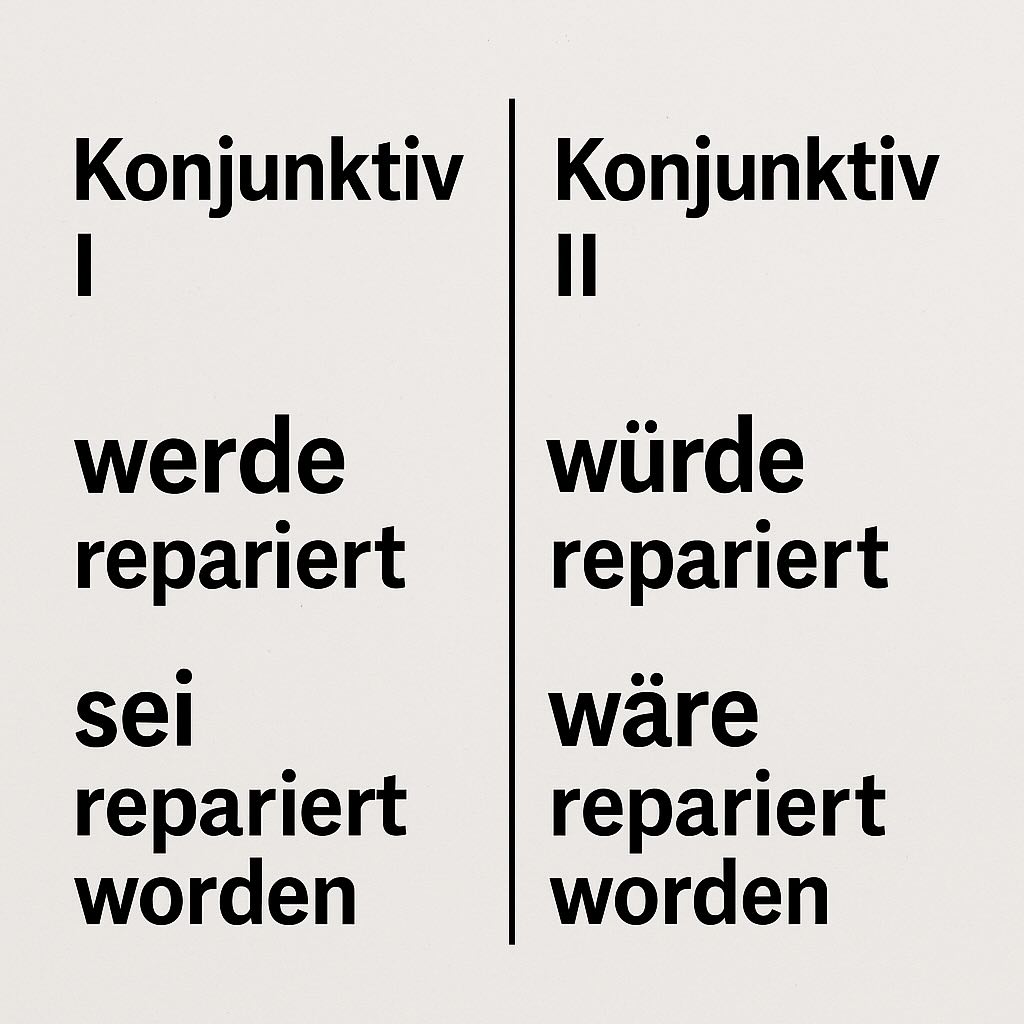Passive in Konjunktiv (Reported Speech & Hypotheticals)
“The passive is hard enough. Add the subjunctive, and you face the real exam monsters.” — Tymur Levitin
The paradox before we start: two subjunctives, two logics
German has two Konjunktiv systems:
- Konjunktiv I — reported speech (indirekte Rede).
- Konjunktiv II — hypothetical, counterfactual, “if only” scenarios.
👉 The paradox: in passive, the forms often look identical to indicative, so German compensates with context, or by switching from K-I to K-II.
Example:
- Es wird gesagt, er sei krank. → Konjunktiv I, reported speech.
- Es würde gesagt, er wäre krank. → Konjunktiv II, hypothetical.
1) Passive in Konjunktiv I (reported speech)
Used in news, academic writing, and formal reports.
Simple forms
- Präsens: Das Auto werde repariert. → “The car is said to be repaired.”
- Perfekt: Das Auto sei repariert worden. → “The car is said to have been repaired.”
- Futur I: Das Auto werde repariert werden. → “The car is said to be going to be repaired.”
- Futur II: Das Auto werde repariert worden sein. → “The car is said to have been going to be repaired.”
With modals
- Präsens: Das Auto könne repariert werden. → “The car can be repaired (is said).”
- Perfekt: Das Auto habe repariert werden können. → “The car could have been repaired (is said).”
⚠️ Note: Many K-I forms (werde repariert) = identical to indicative. Writers often switch to K-II to mark distance.
2) Passive in Konjunktiv II (hypotheticals / irrealis)
Simple forms
- Präsens (hypothetical): Das Auto würde repariert. → “The car would be repaired.”
- Past (unreal past): Das Auto wäre repariert worden. → “The car would have been repaired.”
- Futur I: Das Auto würde repariert werden. → “The car would be repaired (in the future).”
- Futur II: Das Auto würde repariert worden sein. → “The car would have been repaired (by then).”
With modals
- Präsens: Das Auto würde repariert werden können. → “The car would be able to be repaired.”
- Past: Das Auto hätte repariert werden können. → “The car could have been repaired.”
3) The Modal Trap in Perfect Passive (Konjunktiv I & II)
This is the exam trap par excellence — where Duden and method books diverge.
What Duden says
- “Das Partizip Perfekt der Modalverben … wird nicht gebraucht, wenn das Modalverb mit einem weiteren Infinitiv verbunden ist. Stattdessen steht der sogenannte Ersatzinfinitiv.”
- Meaning: no participle (gekonnt, gemusst) if another infinitive is present.
- Passive logic: in perfect tenses, the auxiliary should be sein.
So logically:
- K-I: Das Auto sei repariert werden können.
- K-II: Das Auto wäre repariert werden können.
What exam handbooks enforce
Almost all method books prescribe haben:
- K-I: Das Auto habe repariert werden können.
- K-II: Das Auto hätte repariert werden können.
The paradox
- Logic / Duden → sein.
- Exams / handbooks → haben.
- Reality → learners must know both, but exams accept only haben.
Exam survival
- Konjunktiv I: always write habe repariert werden können.
- Konjunktiv II: always write hätte repariert werden können.
- Know that sei repariert werden können or wäre repariert werden können are logical and align with Duden, but will be marked wrong in exams.
👉 Golden rule: use haben in exams, keep sein in mind to truly understand the system.
4) Indirect speech vs. hypothetical
- Reported speech: Es wird gesagt, er sei krank.
- Hypothetical: Es würde gesagt, er wäre krank.
Difference:
- sei = neutral reported speech.
- wäre = counterfactual, imagined situation.
5) Word order in Konjunktiv passive clusters
Operator follows operand, even in subjunctive clusters:
- …, dass das Auto repariert worden sein würde.
- …, dass es hätte repariert werden können.
These heavy clusters are a classic exam test.
6) Common pitfalls
- Confusing K-I and K-II endings
- K-I: werde repariert
- K-II: würde repariert
- Overusing “würde”
In reported speech, default is K-I (werde, sei, habe). Only switch to K-II if K-I = identical to indicative. - Neglecting modals
hätte repariert werden können = must-know for exams.
7) Exam survival summary
- Reported speech: prefer Konjunktiv I (werde, sei, habe).
- If ambiguous: switch to Konjunktiv II (würde).
- Hypotheticals: always Konjunktiv II (würde repariert / wäre repariert worden).
- With modals in Perfect/Plusquamperfekt: write habe / hätte repariert werden können (exam safe).
- Remember the paradox: sein is logical, haben is exam-accepted.

Series navigation
- Part 1: The Myth of Three Passive Forms
- Part 2: Passive Tenses Without Modals
- Part 3: Passive with Modal Verbs
- Part 4: All Tenses in Full
- Part 5: Recipient Passive
- Part 6: Impersonal Passive
- Part 7: Passive in Konjunktiv (this page)
- Part 8: Academic Passive
- Part 9: The Translation Lab
- Part 10: Survival Strategies
About the author
Tymur Levitin — Founder, Head Teacher & Translator
Author’s rights
© Tymur Levitin — Levitin Language School / Start Language School by Tymur Levitin
Slogan: Global Learning. Personal Approach.














